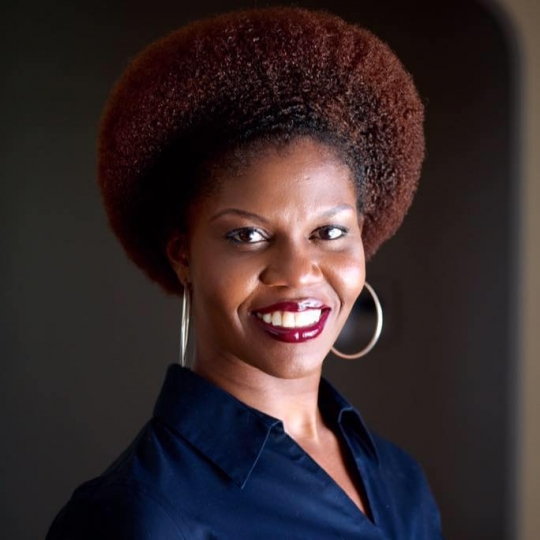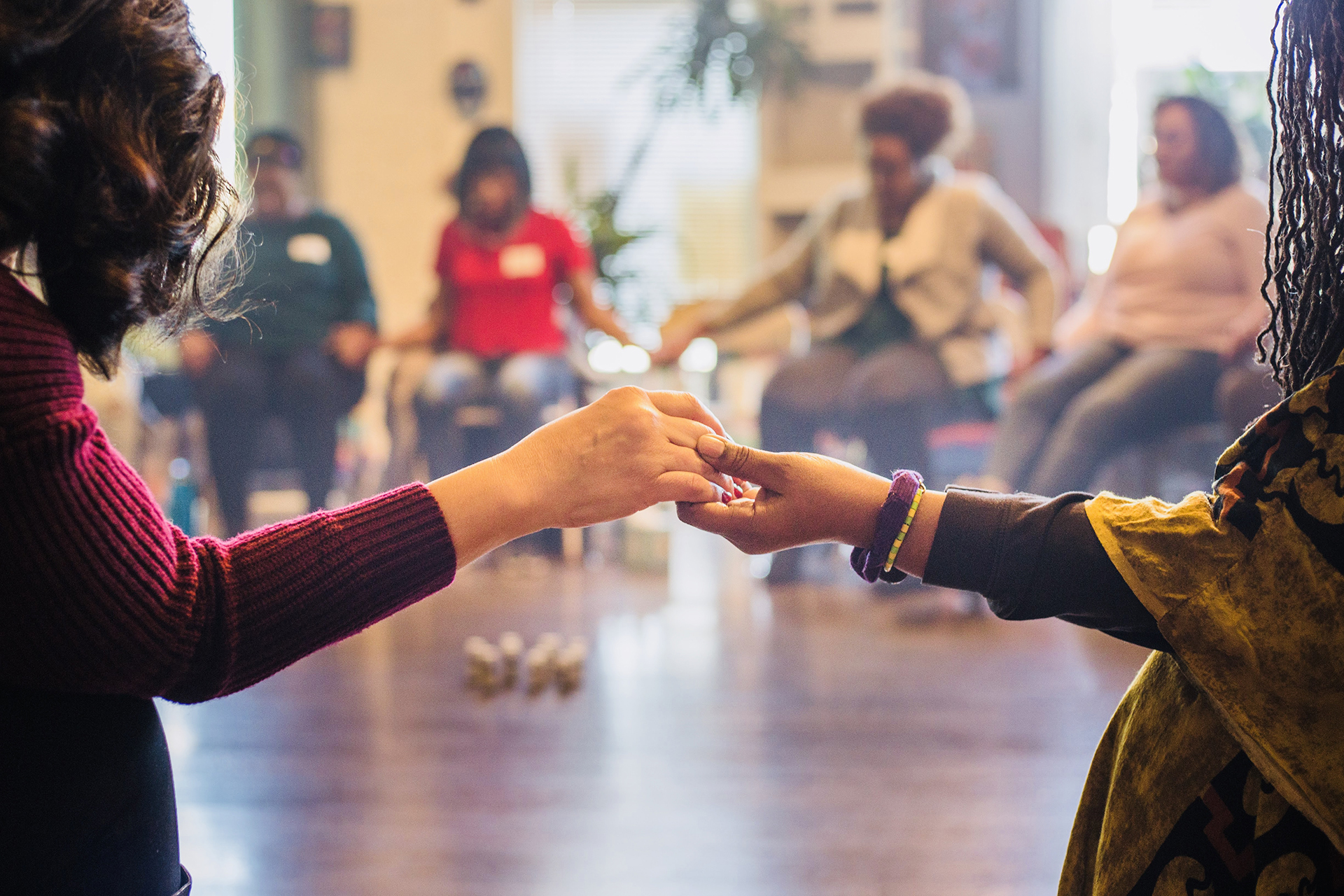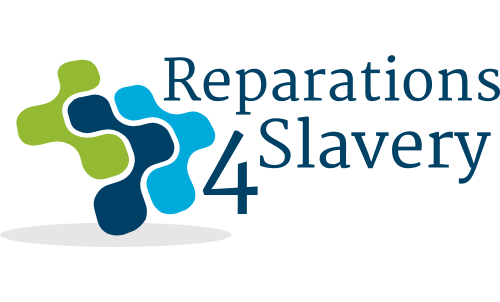Interview with Rev. Dr. Dawn Riley Duval

R4S: Rev. Dawn, please tell me about your family's heritage. Have you traced your ancestry?
DRD: Of course, we know that our ancestors were enslaved Black people. My father’s ancestors trace back to enslaved beloveds in Mississippi. Concerning my mother’s ancestors, we are in the midst of ancestry investigation – actually, on my maternal and paternal sides we are in the process of more deeply investigating our lineage.
R4S: Were any family stories passed down about that time?
DRD: Presently, I do not recall stories about my ancestors during slavery. But I have two favorite stories from the Civil Rights era. One of the stories involves my maternal Great-Grandfather.
While living in Mississippi as a young man, he was involved in a conflict involving a white man that resulted in Great-Granddaddy being shot in the head and losing his left eye and the white guy being killed. Soon a mob of white men chased my Great-Granddaddy out of the city, shooting at him the entire way. Great-Granddaddy fled the region and found himself in Pueblo, Colorado where he met, married, and had a family with my Great-Grandmother. Years later my Great-Granddaddy – who had been working and thriving – began to have headaches.
So, he went to a doctor in Pueblo, Colorado. After some testing, they realized that he had multiple bullets lodged in his skull! BULLETS IN HIS SKULL!!! They couldn’t be surgically removed, so my grandfather lived the rest of his life with the bullets in his head. I love that story because I think it speaks to how strong we are as a people, as a family. Speaks to our power to overcome adversity.
Another story: My maternal Great-Grandmother cared for white families, working to clean their homes and care for their families. When Rev. Dr. Martin Luther King, Jr. was killed, she was working at a white family's home. The family had planned a meal with friends for that night. When the friends arrived, they were all watching T.V. Just before dinner was to be served, an announcer came on the T.V. screen and announced that Rev. Dr. King had been killed. My Granny was extremely upset by the news but being a professional, she kept fulfilling her duties for the evening which included preparing and serving dinner. At one point during the meal, one of the guests remarked, “I’m glad he’s dead! He was nothing but a troublemaker. He got those niggers all in a tizzy.” Upon hearing that, my Granny took the platter she had been carrying and slammed it on the dining table where all who were present were seated. She left the room and didn't return to serve the remaining food items. The room went silent and no one said another word. My Granny risked her job, perhaps even her life on that Thursday night April 4, 1968. Her protest makes me proud.
R4S: When did you receive your life's calling? How did you decide to found Soul 2 Soul Sisters?
DRD: After earning my master’s degree in Print Journalism, I worked as a reporter for the Rocky Mountain News. I loved learning about all the happenings in the Denver Metro area, and it was frustrating covering a story but not being able to directly help people. Soon I decided to attend Vanderbilt Divinity School – I really wanted to focus on social justice work as a faithful person. While I was there, I learned about racial justice work, womanist theology and liberation theology. I came to realize that Black people need to heal from the vestiges of slavery, and white folks do as well.
On August 9, 2014 Reverend Tawana Davis and I – along with millions of other people – were radicalized by the killing of Michael Brown, Jr. Watching him lie in the streets for over four hours, seeing the community wailing and in shock, watching law enforcement’s heartless and militaristic anti-Black response – it radicalized us. We were clear that as faithful Black Womxn we had to respond to this rage we were experiencing but what exactly should we do? Aiyanna Stanley-Jones was killed. Travon Martin was killed. Michael Brown was killed. Tamir Rice was killed. Eric Garner was killed. Sandra Bland was killed. John Crawford was killed. Walter Scott was killed. Freddie Gray was killed … In November 2015, Rev. Tawana and I decided to launch Soul 2 Soul Sisters to do healing work with Black Womxn and anti-white supremacy work with white people through our Facing Racism program.
R4S: S2SS recently received a large donation as reparations from a white woman. How did that come about?
DRD: In the fall of 2018, Soul 2 Soul Sisters received $200,000 reparations from a white woman, who prefers to remain anonymous to the public – we were just totally stunned to receive reparations. This person is a student at Iliff School of Theology, and she attended a workshop that Rev. Tawana and I facilitated at Iliff. In a class that the person was taking, the professor required the students to do research on their family. In doing the research she found out that her great, great-grandmother was gifted a slave named Alice. So, she went back to her professor saying, “I am shaken, I am sickened; I just received an inheritance and I want to make reparations in the name of Alice.” The professor recommended Soul 2 Soul Sisters. Remembering us from the workshop, she did some research on Soul 2 Soul Sisters, called us up and informed us that she wanted to give us her inheritance as reparations.
As I said earlier, Rev. Tawana and I were stunned. We did not know that, during our lifetime, white people would exhibit compassion evidenced in economic humility directed to Soul 2 Soul Sisters. Yes, for years Soul 2 Soul Sisters has been working for reparations through chanting, prayer, meditation, teaching and preaching. But honestly, we thought that our children and our children’s children would reap the benefits of our reparations work. So, we were shocked and so grateful for the $200,000 reparations to Soul 2 Soul Sisters.
R4S: How has the donation affected S2SS’ capacity and programs?

DRD: It has completely transformed our entire organizational culture. The $200,000 reparations assists Soul 2 Soul Sisters in hiring staff and paying staff wages that are just. Finally, we have healthcare. We hired grant writers who help us secure funding to expand our programs. We hired a public relations firm to help us effectively disseminate more broadly the good news about Soul 2 Soul Sisters work. And soon after receiving the $200,000 reparations, Soul 2 Soul Sisters received a large grant from a foundation and other funding. The domino effect of economic justice that came from this reparation has been amazing and hopefully inspiring to other people – Black people and white people.
R4S: What advice might you give a white person who is considering giving reparations?
DRD: I would invite white people to affirm reparations similarly to Soul 2 Soul Sisters. We affirm reparations as acknowledgement, apology, compensation and conciliation for the brutal, merciless, and greed-inspired harms inflicted on enslaved Black people during the entire history of the U.S.A. Just think about America’s addiction to free labor on the backs of Black people. To help us all move toward individual and collective healing, there must be an acknowledgement of historic and present-day sins by white people and white supremacist systems against Black people. Apology also is key. There is an implied commitment to changing behavior. We find that there is transformation in hearts and behavior with acknowledgement, with apology.
One of the tricks of capitalism is that work appears “to just happen,” without an understanding and respect for the labor force. We reject that attitude. There must be reasonable compensation for the hundreds and hundreds of years that Black people, our ancestors, were enslaved in building this country. Compensation is right and righteous. So, whether that compensation looks like money payments, or universal health care, or universal education, or housing, or employment … there needs to be some intentional and substantive compensation for Black people.
Once we’re in the process of acknowledging, apologizing, compensating, there is healing space available for conciliation. We don't talk about reconciliation – there has not been a time in the U.S.A. when Black people have had a relationship to white people that is justly based. So, we are working towards conciliation, working towards cultivating equity and reciprocity and compassion among all people. Acknowledgement, apology, compensation and conciliation.
R4S: What would an apology look like? What behavior needs to change?
DRD: “I am sorry that egregious sins against Black people happened and are happening. I am sorry that my ancestors and I benefit from sins against Black people still today. In going forward, I commit to do things radically more healthy, just and liberative – in my daily life, in my handling of my personal finances, in operationalizing economic justice in my organization/congregation/institution, in my behavior with my family, my co-workers, Black people, white people and all people.”
R4S: What does making reparations look like at the individual level?
DRD: There are a myriad of ways to make reparations! This is the exciting part for me. Soul 2 Soul Sisters encourages white people to be creative, do not overthink. We encourage white people to exercise their emotional intelligence in determining reparations that speaks to their own intuition, reflects their heart and the heart of their family.
Concerning specific examples of reparations giving, white people give to organizations that are doing hands-on transformative work at the community level. And I love it when white people come up with creative reparations – reparations that speak to a person’s true passion and convictions. So, say a person is passionate about healthcare – they could go to a specific African American organization and say, “For the entire life of your organization, my family is going to underwrite the costs for healthcare for this organization’s employees.” Or, if a person is committed to education, their family could underwrite the educational costs for an African American child (or all the children in a family) to attend quality elementary-, middle-, high-schools and colleges that the student/s desires to attend or help pay off a student’s existing debt.
What I’m speaking here is economic compassion. To engage in deep and transformative economic compassion, I implore white people to tap into their natural goodness, passion and creativity.
R4S: What have I not touched on that you would like to say to the audience of Reparations4Slavery.com?
DRD: Our American culture really emphasizes the importance of solid reasoning and logic. It privileges logical intellect. In Soul 2 Soul Sisters Facing Racism programming, we emphasize the need for spiritual, emotional, and physical intellect to be respected and honored toward developing a respect, honor and love of Black people and all people.
Concerning reparations, I invite white people to tap into compassion for descendants of enslaved people who built this country with their blood, sweat and tears so as to really feel compassion, to really experience some level of our pain. Slavery was not “farming,” the middle passage was not a “cruise.” Many millions of African enslaved people died in ships en route to this country, and our brains can hardly conceive the wicked brutality that white people executed upon Black people during the Middle Passage and in the U.S.A. to keep Black people enslaved for hundreds of years as white people capitalized on generations of Black pain. Slavery led to Jim Crow laws which laid the groundwork for the systematic forms of racism that operate today to exclude and disadvantage Black people.
Reparations is medicine for Black pain. On behalf of Soul 2 Soul Sisters, an organization that has been the recipient of reparations, I struggle to articulate the healing and hope that was ignited in each of us individually and collectively from that generosity. That there was an acknowledgement, apology, and reparations to us for Black suffering – I cannot begin to tell you how healing and emboldening that is for us.
